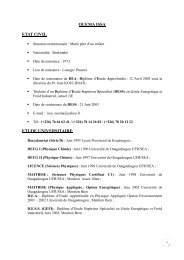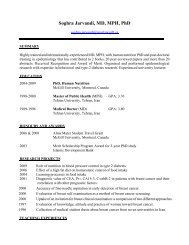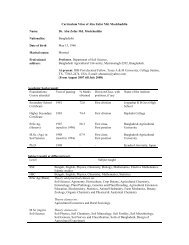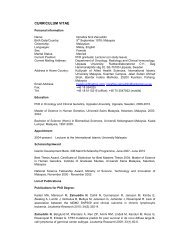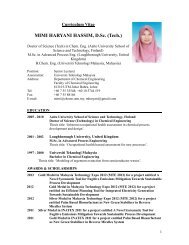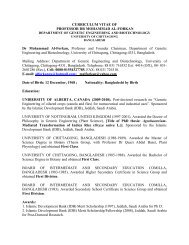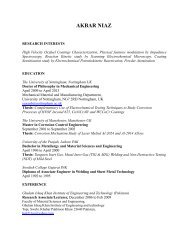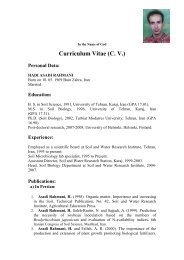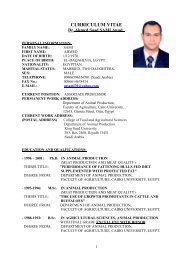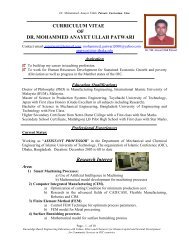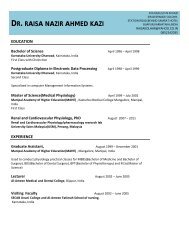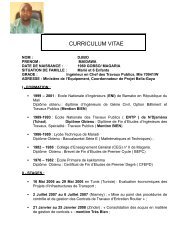Engineering: issues, challenges and opportunities for development ...
Engineering: issues, challenges and opportunities for development ...
Engineering: issues, challenges and opportunities for development ...
You also want an ePaper? Increase the reach of your titles
YUMPU automatically turns print PDFs into web optimized ePapers that Google loves.
ENGINEERING: ISSUES CHALLENGES AND OPPORTUNITIES FOR DEVELOPMENTis where international sponsors to developing countries couldprovide funding to BOTEC to replicate its research results, suchas the need to replicate photovoltaic power stations. Sponsorshipcould also be advanced to undertake specific researchaimed at addressing varied <strong>development</strong> <strong>challenges</strong>.BOTEC is a stage of revising its strategic direction <strong>and</strong> thiswill be done in view of national research priorities, as well asthe Millennium Development Goals of the UN. The revisionof research strategy is always necessary <strong>for</strong> research institutesbecause of the ever-changing l<strong>and</strong>scape of science <strong>and</strong> technology.Whatever the focus areas are, they will be designed toaddress the <strong>development</strong> <strong>issues</strong> of Botswana through science,engineering <strong>and</strong> technology research.7.4.3Technology ConsultancyCentre, GhanaPeggy Oti-BoatengThe emergence of a grassroots Industrial RevolutionThe Kwame Nkrumah University of Science <strong>and</strong> Technology(KNUST) was established in 1954 to train science, technology<strong>and</strong> engineering graduates in response to the push by the firstPresident of Ghana, Dr Kwame Nkruma, <strong>for</strong> industrial independence.A number of departments in science, agriculture,architecture, pharmacy, arts <strong>and</strong> engineering were establishedto develop the needed human resource capacity to harnessGhana’s natural resources <strong>for</strong> the infrastructure, socio-economic<strong>and</strong> industrial <strong>development</strong> of the country. Althoughthese departments trained first-class graduates, there was amissing link between industry, community <strong>and</strong> university.Research findings were seen as not responding to nationalaspirations. This prompted the establishment of the TechnologyConsultancy Centre (TCC) at the University to serve asa ‘one-stop–shop’ <strong>for</strong> responding to industry <strong>and</strong> entrepreneurs.The Technology Consultancy Centre (TCC) was established inJanuary 1972 on the recommendations of the Palmer-McRobieCommittee, which was accepted by the University Council in1971 to foster a closer link between the community, industry<strong>and</strong> the university. TCC was m<strong>and</strong>ated to promote <strong>and</strong>transfer of technologies developed by the university <strong>for</strong> thesolution of grave problems of science <strong>and</strong> technology in thecountry. Importantly, there was a provision <strong>for</strong> <strong>opportunities</strong><strong>for</strong> academic staff to undertake consultancy services.With assistance from the Intermediate Technology DevelopmentGroup (ITDG, now Practical Action) in the UK, theTCC was to serve as an interface between the research <strong>and</strong><strong>development</strong> activities taking place at the university <strong>and</strong> theentrepreneurial aspiration of the Ghanaian public. As a semiautonomousunit within the University, it had the m<strong>and</strong>ateto collate <strong>and</strong> disseminate appropriate research findings <strong>and</strong>technological <strong>development</strong>s towards agricultural <strong>and</strong> industrialgrassroots <strong>development</strong> in Ghana.When the TCC opened its doors in 1972, it was soon realizedthat addressing the <strong>challenges</strong> of <strong>development</strong> in the in<strong>for</strong>malsector <strong>and</strong> small-scale industries was more urgent thanin promoting consultancy services to more affluent levels ofthe public <strong>and</strong> the private sector. It also become apparent thatthe university was more likely to make a sustainable impacton Ghana’s industrial <strong>development</strong> though the promotion ofa grassroots engineering manufacturing base, which wouldultimately foster the growth of all the other productive sectorsof the economy. Finally, it is only through active grassrootsinvolvement that the real context can be understood <strong>and</strong> thereal problems identified; it was soon realized, there<strong>for</strong>e, thatconsultancy services that were not based on such grassrootsexperience are of very limited value.Incubation centres were developed <strong>for</strong> clients to grow theirbusinesses, <strong>and</strong> clients were supplied with machines <strong>and</strong>machine tools on hire-purchase to improve productivity.Through these means, the TCC has, over the years, acquired awealth of knowledge <strong>and</strong> experience needed to promote thesmall-scale industries programme, which later constituted 80per cent of its work.TCC devoted much of its ef<strong>for</strong>ts at the time to appropriatetechnologies <strong>and</strong> small-scale industrial <strong>development</strong>, <strong>and</strong> itassisted in establishing <strong>and</strong> coordinating the management ofa number of production units in the various university faculties.This was, however, not done at the expense of fee-payingconsultancy services, which earned good sums of money <strong>for</strong>senior members <strong>and</strong> their departments at the time.Over the past thirty-six years, the Technology ConsultancyCentre has successfully served as a catalyst <strong>for</strong> networkingbetween its research units, entrepreneurs <strong>and</strong> the community.The TCC has also researched, developed <strong>and</strong> transferreda number of appropriate technologies aimed at enterprise<strong>development</strong>, wealth creation <strong>and</strong> poverty reduction.One of its most successful stories is the <strong>development</strong> of theIntermediate Technology Transfer Unit (ITTU). The ITTUconcept, which seeks to put the technical expertise availableat the university on the doors steps of practitioners inthe in<strong>for</strong>mal industrial area through a series of interventions,marked an important milestone <strong>for</strong> the Technology ConsultancyCentre in 1978. The success of the first two ITTUs inKumasi <strong>and</strong> Tamale led the Government of Ghana to embarkon the Ghana Regional Appropriate Technology IndustrialService (GRATIS) project, with a m<strong>and</strong>ate to establish ITTUsin the remaining eight regional capitals of Ghana by 1990356



